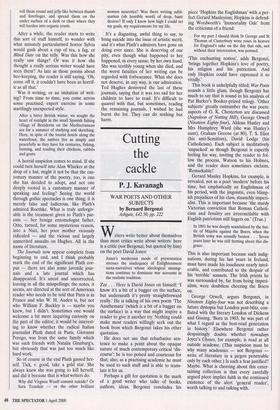Cutting the cackle
P. J. Kavanagh
WAR POETS AND OTHER SUBJECTS by Bernard Bergonzi Ashgate, f42.50, pp. 222 Writers write better about themselves than most critics write about writers: here is a critic (not Bergonzi, but quoted by him) on the poet David Jones:
Jones's modernist mode of presentation stresses the inadequacy of Enlightenment meta-narratives whose ideological assump- tions continue to dominate war accounts in the realistic tradition.
Zzz . . . Here is David Jones on himself: 'I know it's a bit of a bugger on the surface, but underneath it's pretty straightforward really.' He is talking of his own poem 'The Anathemata' (which is a bit of a bugger on the surface) in a way that might inspire a reader to give it another try. Nothing could make most readers willingly seek out the book from which Bergonzi takes his other quotation.
He does not use that rebarbative sen- tence to make a point about the opaque nature of much contemporary critical `dis- course'; he is too poised and courteous for that; also, as a practising academic he must be used to such stuff and is able to trans- late it for us.
Perhaps a gift for quotation is the mark of a good writer who talks of books, authors, ideas. Bergonzi concludes his piece 'Hopkins the Englishman' with a per- fect Gerard Manleyism; Hopkins is defend- ing Wordworth's 'Immortality Ode' from the criticisms of a friend:
For my part I should think St George and St Thomas of Canterbury wore roses in heaven for England's sake on the day that ode, not without their intercession, was penned.
`This enchanting notion', adds Bergonzi, `brings together Hopkins's love of poetry, his religion and his patriotism. And only Hopkins could have expressed it so vividly.'
This book is unhelpfully titled; War Poets sounds a little glum, though Bergonzi has much to say that is sound in his analysis of Pat Barker's Booker-prized trilogy. 'Other subjects' greatly outnumber the war poets: aspects of G. K. Chesterton are discussed (Napoleon of Notting Hill), George Orwell (Nineteen Eighty-four), Aldous Huxley and Mrs Humphrey Ward (she was Huxley's aunt), Graham Greene (at 80), T. S. Eliot (his anti-Semitism), David Lodge (his Catholicism). Each subject is meditatively `unpacked' as though Bergonzi is expertly feeling his way, inviting the reader to fol- low the process, Watson to his Holmes, and the reader does sometimes exclaim, `Remarkable!'
Gerard Manley Hopkins, for example, is revealed, not as a poet 'modern' before his time, but emphatically an Englishman of his period, with the jingoistic, even blimp- ish prejudices of his class, staunchly imperi- alist. This is important because 'the sturdy Victorian conviction that Roman Catholi- cism and Jesuitry are irreconcilable with English patriotism still lingers on.' (True.) In 1881 he was deeply scandalised by the bat- tle of Majuba against the Boers, when the British army was soundly beaten . . . Seven years later he was still fretting about this dis- grace.
This is also important because such indig- nations, during his last years in Ireland, must have made his loneliness nearly intol- erable, and contributed to the despair of his 'terrible' sonnets. The Irish priests he was surrounded by, far from being imperi- alists, were doubtless cheering the Boers on.
George Orwell, argues Bergonzi, in Nineteen Eighty-four was not describing a future dystopia but London post-blitz, con- flated with the literary London of Dickens and Gissing. 'Born in 1903, he was part of what I regard as the best-read generation in history.' Elsewhere Bergonzi rather despairingly doubts whether nowadays Joyce's Ulysses, for example, is read at all outside academe. (This suspicion must be why many academics — not Bergonzi write of literature in a jargon penetrable only by each other.) Is such a fear justified? Maybe. What is cheering about this enter- taining collection is that every carefully argued piece implies faith in the continued existence of the alert 'general reader', worth talking to and talking with.






















































































 Previous page
Previous page